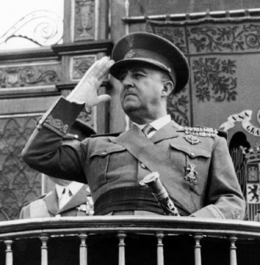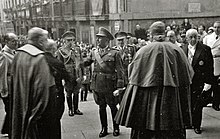Romerism

| Part of a series on |
| Romerism |
|---|
 |
| Categories: |
Romerism (/roʊˈmɛərɪzəm/, roh-MAIR-iz-əm; Creeperian: Րոմերիսմո / Romerismo; Creeperian pronunciation: [romeɾˈismo]) is a far-right political ideology that is characterized by ultranationalism, authoritarian or totalitarian power, forcible suppression of opposition, a strong regimentation of society, and a liberal economic approach. The ideology is opposed to liberalism, democracy, anarchism, communism, and Miguelism — the ideology's far-left counterpart. Romerism is placed on the far-right of the political spectrum, and several Romerist movements have branded themselves as such.
Romerism came to prominence in Creeperopolis in the 1930s and 1940s during the Creeperian Civil War and became the country's dominant ideology following the Catholic Imperial Restoration Council's victory in the civil war. Romerism adheres to the political beliefs of Creeperian emperor Romero I who reigned from 1933 until his death in 1976. Romerism consists of a mixture of several prominent late 19th century and early 20th century right-wing political ideologies including Adolfism (sometimes referred to as "proto-Romerism"), Sáenzism–Falangism, Frentism, and Espigism. Romerism is espoused as the primary ideology of the Creeperian Initiative, the ruling party of Creeperopolis, and Romerism plays an essential role in modern Creeperian politics. Romerism is also promoted by various foreign Creeperian right-wing organizations.
Romerism places a strong emphasis on Creeperian Catholic religious identity and promotes National Catholicism, a policy of using state functions to promote and uphold Creeperian Catholicism in society. Such promotion of Creeperian Catholicism also include the suppression of other religions, most notably Deltinian Islam and atheism. Romerism also emphasizes the need for total government authority through absolute monarchy. Other tenants of Romerism include conservatism, social conservatism, imperialism, Creeperian nationalism, Catholic nationalism, anti-communism, and economic liberalism. Followers and supporters of Romerism are known as Romerists (Րոմերիստոս / Romeristos).
Romerism has been criticized as being fascistic and has been widely condemned for its anti-democratic, authoritarian, and non-inclusive nature. It has also been criticized for promoting violence and wars and has been described as militaristic and imperialist. Virtually all Creeperian left-wing movements describe themselves as anti-Romerists, and several non-Creeperian leftist political movements have aligned themselves in opposition to Romerism. Several governments have expressed their opposition to Romerism through the Declaration on Romerism and Fascism.
Contents
Etymology
The word Romerism is a translation of the Creeperian word Romerismo (Creeperian script: Րոմերիսմո). The word is derived by the name of Romero I, the Creeperian emperor who reigned from 1933 until his death in 1976. Romero I also led the right-wing Catholic Imperial Restoration Council (Imperial Council) during the Creeperian Civil War of 1933 to 1949, during which Romerism initially formed.
Both when the word Romerism was first used and who coined it are unknown, but its earliest confirmed usage dates to around 1938 in propaganda radio messages disseminated to civilians living in Imperial Council-controlled territory during the civil war. Scholars universally agree that the word Romerism was named after Romero I due to his unifying leadership of the country's various right-wing factions which all were competing come out as the leading force following the civil war. These factions united under Romero I, and overtime, they merged into a single political entity — the Creeperian Initiative — in 1949 following the end of the civil war and proclaimed Romerism as their ideology. Romero I himself did not use the word Romerism in an official capacity until 1946 sometime after the beginning of the Siege of San Salvador.
Followers of Romerism refer to themselves as Romerists (Րոմերիստոս / Romeristos) and often openly identify as such. As such, many Romerist movements and political organizations label themselves as being Romerist. The adjective Romerist is sometimes used as a pejorative by opponents of Romerism, who refer to themselves as anti-Romerists.
Definition
According to most historians and political scientists, Romerism is an authoritarian form of conservatism which encompasses elements of nationalism, militarism, monarchism, and anti-communism to assert absolute control over government and society. It is generally placed on the far-right of the political spectrum, and many Romerist theorists and advocates assert that Romerism is a right-wing to far-right ideology. Additionally, Romerism attracts support from the political right due to its anti-communist, anti-liberal, and anti-progressive agendas.
According to the Creeperian-born Salvadoran politician and professor Orlando Pareja Palau, Romerism is centered around three main "destinies":
- Preservation of God, tradition, and society
- Eradication of degeneracy, leftism, and democracy
- Securement of peace, justice, and tranquility
In the 1930s and early 1940s, Romerism was not a distinct political ideology, but was generally used as an umbrella term to describe the various competing political ideologies of the Imperial Council. The Imperial Council unified a wide range of right-wing political ideologies under one banner against the leftist ideologies of the National Council, for which Miguelism also initially served as an umbrella term. The various ideologies under the banner of Romerism included:
| Ideology | Founder | Emerged | Ideology | Organization(s) |
|---|---|---|---|---|
| Adolfism | 1830s to 1890s |
|
Catholic Royalist Party | |
| Espigism | Macos Espiga Mina | 1880s to 1890s |
|
National Conservative Party |
| Frentism | Adolfo Rivera López | 1940s |
|
Militarist Nationalist Front |
| Illescism | Máximo Illescas Freixa | 1930s |
|
National Conservative Party |
| Negrism | Carlos Hernández Videla | 1920s |
|
|
| Sáenzism–Falangism | Antonio Sáenz Heredia | 1900s to 1910s |
|
Many scholars and political scientists have identified the following as the primary tenants of the Romerist ideology:
- Anti-Atheism
- Anti-communism
- Anti-democratism
- Anti-Islamism
- Anti-Protestantism
- Authoritarianism/totalitarianism
- Catholic nationalism
- Creeperian nationalism
- Imperialism
- Monarchism
- National Catholicism
- Social conservatism
History
Pre-civil war origins
For most of Creeperian history, Creeperopolis was ruled by absolute monarch, however, several rebellions, civil wars, and attempted coups challenged the monarch's absolute power. The Republican War of 1729 to 1741 saw the formation of the Republic of Creeperopolis led by President Orlando Moreno Hidalgo and the attempted abolition of the monarchy. Although the republicans were defeated, the short-lived republic introduced proof to Creeperian liberals that a republican-style of government could be established in Creeperopolis.
The monarchy's absolute power peaked between 1833 and 1887 under Emperor Adolfo III during a period known as the Adolfisto. During Adolfo III's rule, Creeperian imperial expansion was at its peak. As a result of the Great Surian War, Creeperopolis annexed the kingdoms of Senvar and Rakeo and annexed territory from the Kingdom of Castilliano. Additionally, in 1858, Creeperopolis conquered El Salvador and turned it into a captaincy general. During the Adolfisto, Creeperian Catholic Church enjoyed many privileges and held a hegemony over Creeperian society.
During the mid-1880s, many Creeperian intellectuals and students began calling for the liberalization and democratization of the country. Adolfo III and the ruling class resisted their efforts and violence emerged across the country for the return of democracy to the country. After Adolfo III's death in late-1887, his successor, Gustavo I, was forced to negotiate with the proponents of democratic reform and allowed for general elections to be held only three weeks after Adolfo III's death. The election resulted in the center-left National Liberal Party (PLN) winning the election and Inhué Ordóñez Yepes becoming prime minister. Protests and riots against the results of the election, which was very limited in scope as only 100,000 citizens were allowed to vote in a country of over 380 million, forced Ordóñez Yepes to hold a snap election the following year in which he retained the premiership.
The center-right National Conservative Party (PCN) supported the transition to democracy but opposed many of the proposed Liberals' reforms. In contrast, the right-wing Catholic Royalist Party (PRC) was strongly opposed to democracy and sought to full restoration of the absolute monarchy. The Royalists were led by Francisco Dueñas Díaz, and many Liberals and Conservatives described his and the party's political positions as "Adolfist", a label which he and the party embraced. Adolfism is sometimes referred to by historians as "proto-Romerism" due to it being the effective forerunner of modern Romerism.
Formation during the civil war
Post-civil war hegemony
Tenants
Authoritarianism
Nationalism
Militarism

National Catholicism
Economics
Anti-communism
Social conservatism
Cult of personality
Criticism
Identification as fascist
Anti-democratic nature
Imperialism
Catholic hegemony
Comparison to other ideologies
Miguelism
Nerism
Symbology
Symbols
Mottos and slogans
- Devajo Dios yel Emperador (Under God and the Emperor)
- Viva Creeperópolis (Hail Creeperopolis)
- Viva Dios (Hail God)
- Con Dios, Venceremos (We have Victory with God)
- Con San Romero, Venceremos (We have Victory with Saint Romero)
- Patria y Libertad (Fatherland and Liberty)
- Quen la'Patria, Empieza la'Amanecer (For in the Fatherland, Dawn Begins)
- Un Pueblo, Un Patria, Un Dios (One People, One Fatherland, One God)
- Un Pueblo, Un Patria, Un Emperador (One People, One Fatherland, One Emperor)
- Viva Cristo Rey (Hail Christ the King)
Romerist theorists
- Enrique Agramonte Leoz
- Julio Alda Miqueleiz
- Benito Aparicio Capmany
- Manuel Arboleda Guillén
- Uxio Aponte Avellaneda
- Ignacio Barrios Prats
- Adolfo Cabañeras Moreno
- Alfonso Cabañeras Moreno
- Emmanuel Cabañeras Videla
- Augusto Cabañeras Gutiérrez
- Sancho Dávila Fernández
- Pedro Espiga Ordóñez
- Enrique Figueroa Guerrero
- Rubén Franco Alcabú
- Nazaret García Seco
- Alfonso García Valdecasas
- Carlos Hernández Videla
- Máximo Illescas Freixa
- Elías Mancebo Muñoz
- Josué Manzanedo Seco
- Adolfo V Martínez Escobar
- Romero III Martínez Escobar
- Romero I Martínez Galdámez
- Romero II Martínez Guerrero
- Alexander II Martínez Hernández
- Alexander I Martínez Jiménez
- Orlando Pareja Palau
- Adolfo Rivera López
- Armando Rodríguez Vera
- Antonio Sáenz Heredia
- Alexander Sánchez Molina
- Ramón Serrano Suñer
- Juan Torres González
- Óscar Únzaga Vega



